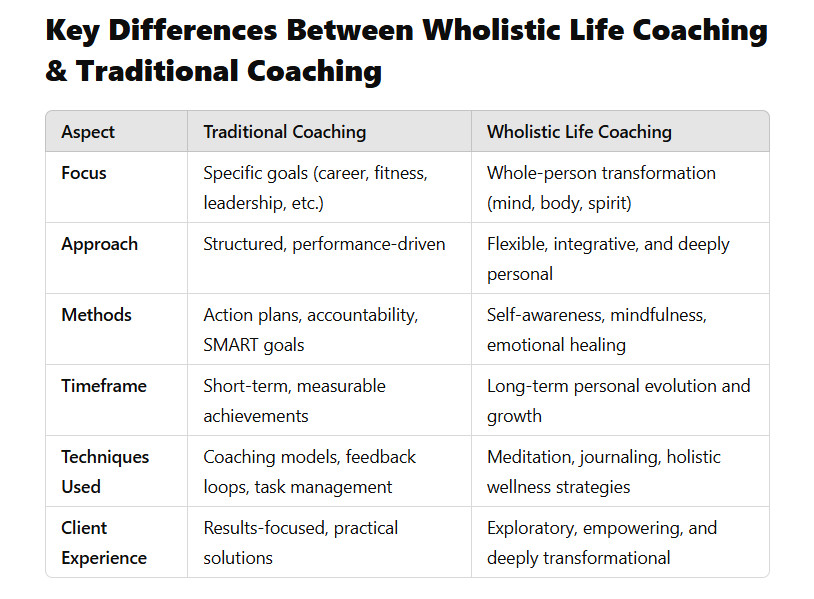The coaching industry has grown significantly in recent years, offering numerous pathways for individuals seeking personal growth and professional success. Among the many approaches, wholistic life coaching has gained traction as a transformative method that goes beyond traditional coaching frameworks. But what exactly differentiates wholistic life coaching from traditional coaching? Understanding these distinctions can help aspiring coaches and clients choose the right path for their needs.

Traditional coaching is typically goal-oriented and focuses on specific areas of improvement in a client’s personal or professional life. It follows structured methodologies that provide clarity, accountability, and motivation to achieve measurable results. Traditional coaching is commonly found in fields such as: 📌 Executive coaching – Leadership development and business strategy. 📌 Career coaching – Resume building, interview preparation, and career transitions. 📌 Health coaching – Weight loss, fitness routines, and nutrition guidance. 📌 Relationship coaching – Navigating dating, marriage, and family dynamics. While traditional coaching is highly effective for setting and achieving goals, it often compartmentalizes different aspects of life and may not address the deeper emotional, spiritual, or physical challenges that impact success. Wholistic life coaching is a whole-person approach that considers the interconnectedness of mind, body, and spirit. Rather than focusing solely on achieving external goals, wholistic coaching helps clients develop a deeper self-awareness, balance, and inner alignment. This coaching style integrates multiple dimensions of well-being, including: ✔ Mental clarity – Overcoming self-limiting beliefs and fostering personal empowerment. By addressing all these elements, wholistic life coaching facilitates lasting transformation, helping individuals not only achieve their goals but also sustain their progress over time. 1. A Deeper Understanding of the Self Traditional coaching helps clients work toward specific objectives, but wholistic coaching provides insight into the deeper patterns shaping their decisions, behaviors, and emotional well-being. By developing self-awareness, clients can make lasting changes that impact every area of their lives. 2. Addressing the Root Cause, Not Just the Symptoms While traditional coaching often focuses on correcting surface-level issues, wholistic coaching uncovers the underlying challenges preventing personal fulfillment. This can include limiting beliefs, unprocessed emotions, or imbalances in physical and mental health. 3. Sustainable Growth & Transformation Many people achieve short-term success but struggle to maintain motivation and progress. Because wholistic coaching nurtures a balanced lifestyle, clients experience longer-lasting improvements in their confidence, relationships, and well-being. 4. Greater Alignment Between Mind, Body & Spirit A holistic approach ensures that a client’s external success aligns with their internal values and desires. This creates a more fulfilling and meaningful life path, reducing stress and increasing overall satisfaction. 5. Flexibility & Personalization Unlike rigid traditional coaching programs, wholistic coaching is highly adaptable. It allows clients to explore multiple areas of life simultaneously, creating a personalized roadmap for transformation that resonates with their unique journey. While traditional coaching works well for those who thrive in goal-driven, action-oriented environments, wholistic coaching is ideal for: 📌 Individuals seeking deeper meaning in their personal or professional life. 📌 People struggling with stress, anxiety, or life transitions. 📌 Anyone looking to integrate mental, emotional, physical, and spiritual well-being. 📌 Clients who want to redefine success in a way that aligns with their true values. If you are passionate about guiding others toward balanced, fulfilling lives, becoming a certified wholistic life coach can be an incredibly rewarding career choice. Here are the steps to get started: Step 1: Choose the Right Certification Program Not all coaching programs offer a holistic perspective. Look for a certification that includes: ✔ Emotional intelligence & self-awareness training. The Wholistic Life Coaching Certification Program provides a structured yet flexible curriculum designed to empower future coaches with the tools they need to succeed. Step 2: Gain Practical Coaching Experience Learning the theory is important, but real-world application is essential. A high-quality certification program should include: ✔ Coaching practicums where students gain hands-on experience. Step 3: Establish Your Coaching Practice Once certified, build your coaching business by: ✔ Creating coaching packages tailored to your ideal client. Both traditional coaching and wholistic life coaching have their place in the personal development world, but for those seeking deep, sustainable transformation, a wholistic approach is the way forward. By integrating mind, body, and spirit, wholistic coaching empowers clients to live in full alignment with their values, dreams, and potential. If you are ready to explore wholistic life coaching as a career or personal development path, check out the Wholistic Life Coaching Certification Program and take the first step toward meaningful, long-lasting change! What is Wholistic Life Coaching?
✔ Emotional intelligence – Managing stress, enhancing self-love, and improving resilience.
✔ Physical vitality – Encouraging healthy habits, movement, and overall wellness.
✔ Spiritual connection – Finding purpose, practicing mindfulness, and cultivating inner peace.
Benefits of Wholistic Life Coaching
Who is Wholistic Life Coaching For?
How to Become a Certified Wholistic Life Coach
✔ Strategies for stress management & mindfulness.
✔ Techniques for building resilience and personal empowerment.
✔ A comprehensive approach to guiding transformation.
✔ Peer coaching opportunities for practice and feedback.
✔ Mentorship from experienced holistic coaches.
✔ Developing a strong online presence (website, blog, social media).
✔ Networking with like-minded professionals and potential clients.
✔ Offering introductory coaching sessions to build credibility and trust.Final Thoughts